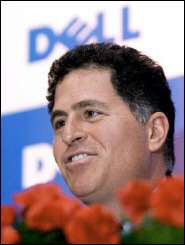Dell, Apple winners in tech-brand survey

In the technology name game, Dell reigns supreme, Apple continues to rise, and Microsoft is in trouble, according to the results of a study by Forrester Research.
The study, titled "The 2005 Technology Brand Scorecard," surveyed more than 4,000 U.S. households about 22 technology brands, then used the results to grade each brand on brand trust, brand potential and brand adoption.
One of the strongest showings came from computer-maker Dell, which got an overall A-plus. Ted Schadler, Forrester vice president and author of the study, said that Dell's reputation for quality in products and services led to the grade.
"Dell has done a good job creating a brand image," he said. "The data shows that people trust them and want to use their products in the future."
However, Schadler said, Dell is going to have to alter its target market from online sales to retail stores in order to fully take advantage of this.
"The untapped market doesn't look like Dell's current market," he said. "They have to go mainstream."
Other brand names ranking among the top of the study were PC manufacturer Hewlett-Packard and electronics-equipment producers Sony, Bose and Panasonic.
While Apple Computers received a middling overall grade of B, it was one of only two brands (along with digital video recording giant TiVo) to see an increase in brand trust since the last Technology Brand Scorecard in 2003.
While Apple's brand-trust score was among the best, its brand adoption was deceptively low. Schadler believes this is because of a lack of brand recognition.
"Not many users think they're using the Apple brand" when they use their iPod or purchase music from iTunes, he said.
This bit of information is potentially harmful to Apple, which had been hoping for a "halo effect" where the popularity of the iPod and iTunes would rub off and help sales of Macintosh computers.
While Apple's grade was helped by brand trust, Microsoft's was dragged down by that category.
"More people said that they don't trust Microsoft than just about any other brand," Schadler noted.
He said that Microsoft's poor trust score came partly because of the prevalence of spam, phishing, viruses and the "blue screen of death" and similar software problems.
Schadler said another reason for low user trust is the lack of a consumer relationship, since Microsoft does not directly sell to consumers but has its products sold through Dell and other PC manufacturers.
Additionally, because Microsoft's Windows operating system is so ubiquitous, the company is well-branded but has limited growth potential.
"A lot of people know they are using Microsoft, but not many that currently don't said they want to use it," Schadler said.
As well, the survey tallied a large number of at-risk Microsoft users (defined as current Microsoft users who gave the brand a low trust score), which could represent a potential source of growth for Apple.
Brands ranking close to the bottom with Microsoft were PC maker Gateway, mobile-phone manufacturer LG, and electronics companies Toshiba and Hitachi.
Schadler said that PC manufacturers tended to do better than makers of televisions and other electronics equipment in the study.
"This reflects a closer relationship with the PC for users," he said.
Copyright 2006 by United Press International

















